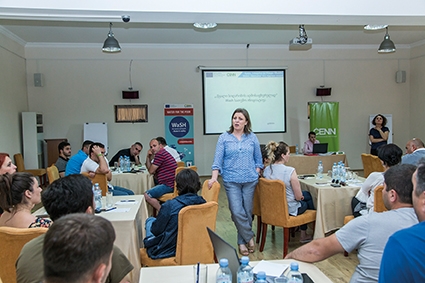Capacity Building Trainings on the Topic of WaSH
Within the EU-funded project, “Water for the Poor,” CENN organized three sessions of WaSH Capacity Building trainings in the months of June and July. About 100 local actors from seven municipalities in the Kakheti and Kvemo Kartli regions attended the trainings. Participants included active citizens, municipality and NGO representatives, journalists, teachers and students.
The aim of the workshop was to build the capacity of stakeholders and target groups regarding their understanding of WaSH topics and techniques for writing project proposals. The first day of the training was devoted to discussions and lectures on topics ranging from access to clean water to the intersectionality of WaSH topics with other human rights. Lectures were coupled with activities, case study analyses, and visuals intended to deepen the attendees’ understanding of WaSH as a human right.
“At CENN, we believe that access to clean water that is safe, drinkable and physically and economically accessible for personal and household needs is a basic human right,” stated Melano Tkabladze, Project Manager of the “Water for the Poor” initiative.. By working with local communities at the municipal level, we hope to mainstream WaSH topics and build the capacity of vulnerable groups and other stakeholders in our target regions.”
During the second day of the session, participants were presented with a grant manual addressing the following WaSH topics: healthcare and social welfare, education and awareness raising, small infrastructure project implementation, and environment and natural resource management.
Participants were then divided into teams and started to work within the context of their municipalities and learned about and developed project proposals addressing WaSH issues in their communities. Upon the conclusion of the workshop series, participants had produced 15 distinct proposals. With the knowledge and skills obtained throughout the workshop, participants should be better equipped to engage in active lobbying and advocating for WaSH issues in their communities.
The Mayor of Lagodekhi Municipality, Jondo Mdivnishvili, reflected on the trainings, stating that: “Municipalities play a big role in trying to solve WaSH-related problems. Therefore, attending events like the WaSH Capacity Building Trainings is important for us. The experiences gained by myself and other members from Lagodekhi Municipality will help guide us in responding to questions relating to water accessibility as a human right. After the trainings, we made the conscious decision to continue working more actively in this field to ensure Lagodekhi Municipality residents have the right to clean water, sanitation and hygiene.”
In the upcoming week, CENN will be releasing a grant competition related to WaSH topics. Municipalities from the trainings will be allowed to participate and the grant will be an opportunity for the seven municipalities to implement the technical skills they developed during the workshop.
The aforementioned capacity-building events were organized under the EU-supported project “Water for the Poor,” which is implemented by CENN in partnership with the Human Rights Center (HRC) and the Women and the World (WW) Association.












